SSG: Spy/Spec-Ops Group discussion

This topic is about
Memoirs of a British Agent
Hot topics
>
"Reilly: Ace of Spies"
date newest »
newest »
 newest »
newest »
p.s. Next time you're at this library look for something called, 'Q-Planes' which stars good buddies Lawrence Olivier and Ralph Richardson.
This obscure WWII espionage-comedy (made during the war) has some real fascination to it. It's one of those early forerunners to so many later genre romps we all know in plenty. Anything you ever see in the, "Spies Like Us" vein, likely stems from "Q-Planes".
Richardson is probably my all-time favorite British actor; and here he conceives a character which (Patrick MacNee later admitted) he modeled his "John Steed" upon in the legendary "The Avengers".
By the way, Dame Diana Rigg passed away this past month.
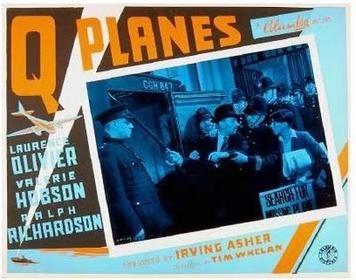
This obscure WWII espionage-comedy (made during the war) has some real fascination to it. It's one of those early forerunners to so many later genre romps we all know in plenty. Anything you ever see in the, "Spies Like Us" vein, likely stems from "Q-Planes".
Richardson is probably my all-time favorite British actor; and here he conceives a character which (Patrick MacNee later admitted) he modeled his "John Steed" upon in the legendary "The Avengers".
By the way, Dame Diana Rigg passed away this past month.

"Q Planes" was a play on the concept of "Q ships" which posed a difficult question during the Battle of the Atlantic. The issue swirled around what kinds of ships the Kriegsmarine could legitimately sink; and upon sinking a vessel, what obligations might Germans be under as far as the Rules of the Sea? It goes back to WWI. Hospital ships were sunk; commercial ships were sunk (on the suspicion that they were carrying aid from the USA); and ultimately merchant ships were used as judas-goats to lure u-boats within range for sinking. What a ballsup.
Paul you probably won't even believe the episodes where Feliks D. plots against Sidney Reilly all the way across Europe back when Reilly was safe in England --that's how deadly serious enemies they had become --but yep even that part of the tale is true. It seems utterly fantastic, as if from a Sax Rohmer story.
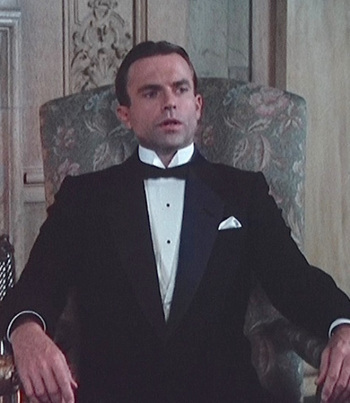
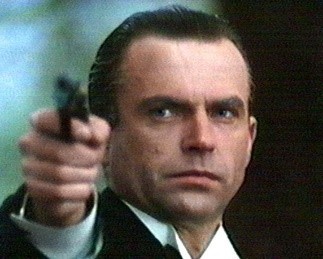
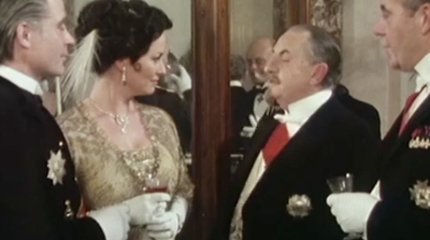
Leo McKern as 'Basil Zhakaroff'

'butcher of the lubyanka' (my namesake)
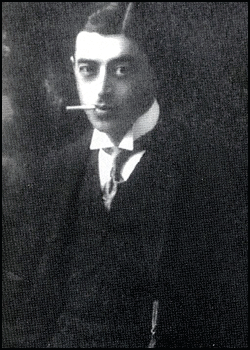
the real Sidney Reilly. international man of mystery...
 Years back, Feliks' review persuaded me to read Memoirs Of A British Agent: Being An Account Of The Author's Early Life In Many Lands And Of His Official Mission To Moscow In 1918. If I recall correctly, Sidney Reilly is seen in passing.
Years back, Feliks' review persuaded me to read Memoirs Of A British Agent: Being An Account Of The Author's Early Life In Many Lands And Of His Official Mission To Moscow In 1918. If I recall correctly, Sidney Reilly is seen in passing.Quoting from Feliks' review: "I can't recall that I've ever read an autobiography or memoir as gripping and entertaining as this one. Yes indeed. I'd rank this as the #1 most adventurous memoir I've ever encountered."
Thanks for the recommendation, Feliks!
You liked that one, eh? Hurrah
Yep. The Balkans were simply chock-full of intrepid British figures in those days. Bruce Lockhart was one; (he of the above-mentioned account) and his son wrote (re-wrote?) the material in 1967 --it was upon this, which the Reilly tv series was based. Something like that; I can't keep it straight anymore.
And I still do not have an exact list of precisely who was were during the coup plot and as the embassies fell. Somerset Maugham gives one account; Lockhart gives another. Suffice to say there were extraordinary figures dashing about in sleighs in the night, armed, (or laden with files) from one empty mansion to another.
New material keeps turning up, as well. I discovered recently a book by James Hilton; Knight Without Armor, an author of whom I am a sincere fan. I believe his novel became a Marlene Dietrich / Robert Donat movie of the same name.
I should explore further what Kennan and Bohlen have to say about it (two members of the Wise Men) but I have too many other projects to pursue.
Anyway thanks for chiming in, Breeze
Yep. The Balkans were simply chock-full of intrepid British figures in those days. Bruce Lockhart was one; (he of the above-mentioned account) and his son wrote (re-wrote?) the material in 1967 --it was upon this, which the Reilly tv series was based. Something like that; I can't keep it straight anymore.
And I still do not have an exact list of precisely who was were during the coup plot and as the embassies fell. Somerset Maugham gives one account; Lockhart gives another. Suffice to say there were extraordinary figures dashing about in sleighs in the night, armed, (or laden with files) from one empty mansion to another.
New material keeps turning up, as well. I discovered recently a book by James Hilton; Knight Without Armor, an author of whom I am a sincere fan. I believe his novel became a Marlene Dietrich / Robert Donat movie of the same name.
I should explore further what Kennan and Bohlen have to say about it (two members of the Wise Men) but I have too many other projects to pursue.
Anyway thanks for chiming in, Breeze
Paul, the Russo-Sino War ...it's not too much to say that it is one of the cornerstones of 20th c. naval history.
The successful attack by Japan on the Russkie fleet implanted the 'sneak attack' mindset in the Japanese military regime; this dominated their empire for the next half-century; and they basically wanted to repeat their 1904 victory in 1941.
Glad you're now digging the unfolding of the series.
Is it all true? Everything you're seeing? No, not in the sense we appreciate today, in the world of forensic DNA tests.
The are certainly 'chewy' mouthfuls of truth in every Reilly episode; but even before this series Reilly was a legendary figure; and naturally his deeds had long been 'embroidered upon', by himself and by other authors down over the years.
The episodes strive to express the credible aspects of the most popular accounts of his exploits, without sacrificing good drama.
Who knows many women he bedded? No way to tell. Who knows exactly what maneuver he used with Zhakaroff? No way to tell. We know that he was involved in many of these British gambles but not precisely what he did.
But when it get the history of the coup de'tat in St Petersburg, you will find much firmer ground if you care to investigate that story.
The successful attack by Japan on the Russkie fleet implanted the 'sneak attack' mindset in the Japanese military regime; this dominated their empire for the next half-century; and they basically wanted to repeat their 1904 victory in 1941.
Glad you're now digging the unfolding of the series.
Is it all true? Everything you're seeing? No, not in the sense we appreciate today, in the world of forensic DNA tests.
The are certainly 'chewy' mouthfuls of truth in every Reilly episode; but even before this series Reilly was a legendary figure; and naturally his deeds had long been 'embroidered upon', by himself and by other authors down over the years.
The episodes strive to express the credible aspects of the most popular accounts of his exploits, without sacrificing good drama.
Who knows many women he bedded? No way to tell. Who knows exactly what maneuver he used with Zhakaroff? No way to tell. We know that he was involved in many of these British gambles but not precisely what he did.
But when it get the history of the coup de'tat in St Petersburg, you will find much firmer ground if you care to investigate that story.
Basil Zhakaroff was a Mephistolean character of that era. A real cuttroat. International arms dealer; crime lord ...nothing was too low for that guy to stoop to.
This was the 'dreadnought' battleship age, so 'arms dealer' doesn't begin to cover the stakes involved.
The remark above about how 'a lone Englishmen wasn't spotted' --well you should understand that the series could only use English actors with English accents; or else things would bog down. They sought for European accents whenever they could; but if you see Reilly slipping into a boat of Greeks and still speaking English you should make the mental leap that he was probably speaking Greek. The production simply chose to go with a simple delivery. This is the case with a lot of productions; for instance in British war films yep you'll find Wehrmacht officers speaking English.
This was the 'dreadnought' battleship age, so 'arms dealer' doesn't begin to cover the stakes involved.
The remark above about how 'a lone Englishmen wasn't spotted' --well you should understand that the series could only use English actors with English accents; or else things would bog down. They sought for European accents whenever they could; but if you see Reilly slipping into a boat of Greeks and still speaking English you should make the mental leap that he was probably speaking Greek. The production simply chose to go with a simple delivery. This is the case with a lot of productions; for instance in British war films yep you'll find Wehrmacht officers speaking English.
How about those wardrobes too? Dang, those Edwardian-era suits are sharp
One of my favorite scenes though is where Reilly is undercover in Hamburg or somewhere, tracking battleship contracts or battleship plans or something and so to 'blend in' he dresses and lives as a dockworker in a slovenly flat crammed in with a German family. So here he comes down the street, in a black sailor cap and a navy pea-coat, after putting in a long day's work like the rest of the men on the street, and as he walks along he munches on a raw onion...
One of my favorite scenes though is where Reilly is undercover in Hamburg or somewhere, tracking battleship contracts or battleship plans or something and so to 'blend in' he dresses and lives as a dockworker in a slovenly flat crammed in with a German family. So here he comes down the street, in a black sailor cap and a navy pea-coat, after putting in a long day's work like the rest of the men on the street, and as he walks along he munches on a raw onion...
 Reilly sure did move around, Baku, Port Arthur, St. Petersburg, Hamburg. Once excellent series with some great attention to detail.
Reilly sure did move around, Baku, Port Arthur, St. Petersburg, Hamburg. Once excellent series with some great attention to detail.
When did 'gentlemen' stop 'playing' spies? The shipyard episode is fine as far as it goes; for Reilly was in real life, quite a bit of a rotter.
But I'd probably move the date back to the Franco-Prussian war and the scandal of Colonel Redl. That was when dossiers and files came into being.
It's also true what you say that international espionage being such a new form of crime in the years prior to WWI. But it had been brought about by all the new forms of travel: steamships and trains linking countries together; new border controls; new factories and new mines. Prior to the Industrial Revolution, spying was more purely related to troop movements.
Ironically, after WWI (as B. Traven confirms) the free movement of people from one country to another was rigorously halted; and everyone must needs --from then on --possess identity papers, passports, visas, travel permits, and work permits.
But I'd probably move the date back to the Franco-Prussian war and the scandal of Colonel Redl. That was when dossiers and files came into being.
It's also true what you say that international espionage being such a new form of crime in the years prior to WWI. But it had been brought about by all the new forms of travel: steamships and trains linking countries together; new border controls; new factories and new mines. Prior to the Industrial Revolution, spying was more purely related to troop movements.
Ironically, after WWI (as B. Traven confirms) the free movement of people from one country to another was rigorously halted; and everyone must needs --from then on --possess identity papers, passports, visas, travel permits, and work permits.
When did 'gentlemen' stop 'playing' spies? The shipyard episode is fine as far as it goes; for Reilly was in real life, quite a bit of a rotter.
But I'd probably move the date back to the Franco-Prussian war and the scandal of Colonel Redl. That was when dossiers and files came into being.
It's also true what you say that international espionage being such a new form of crime in the years prior to WWI. But it had been brought about by all the new forms of travel: steamships and trains linking countries together; new border controls; new factories and new mines. Prior to the Industrial Revolution, spying was more purely related to troop movements.
Ironically, after WWI (as B. Traven confirms) the free movement of people from one country to another was rigorously halted; and everyone must needs --from then on --possess identity papers, passports, visas, travel permits, and work permits.
But I'd probably move the date back to the Franco-Prussian war and the scandal of Colonel Redl. That was when dossiers and files came into being.
It's also true what you say that international espionage being such a new form of crime in the years prior to WWI. But it had been brought about by all the new forms of travel: steamships and trains linking countries together; new border controls; new factories and new mines. Prior to the Industrial Revolution, spying was more purely related to troop movements.
Ironically, after WWI (as B. Traven confirms) the free movement of people from one country to another was rigorously halted; and everyone must needs --from then on --possess identity papers, passports, visas, travel permits, and work permits.
 Paul wrote: "Doubledf99.99 wrote: "Reilly sure did move around, Baku, Port Arthur, St. Petersburg, Hamburg. Once excellent series with some great attention to detail."
Paul wrote: "Doubledf99.99 wrote: "Reilly sure did move around, Baku, Port Arthur, St. Petersburg, Hamburg. Once excellent series with some great attention to detail."...by the way, I did enjoy your photos on..."
If your ever back in this part of the world the 1st round is on me.
One thing not made sharp or distinct as it might have been in the series: Sam Neil's character Reilly often adventures through each episode with a rather quiet, earnest, helpful friend from the British Foreign Office. That is Bruce Lockhart, played by Hugh Fraser.
At least, this is what I recall off the top of my head without double-checking. But in any case, you will see this companion of Reilly in almost every episode but whoever he is, is almost never explicated distinctly. That was my experience, anyway.
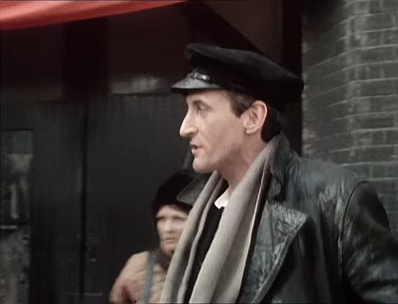
At least, this is what I recall off the top of my head without double-checking. But in any case, you will see this companion of Reilly in almost every episode but whoever he is, is almost never explicated distinctly. That was my experience, anyway.

More dapper than Hugh Fraser? H'mmm. Wonder who that could be. You might remember Fraser from the well-regarded Hercule Poirot series with David Suchet; he played 'Captain Hastings' or whatever his name was.
Hugh Fraser is very tall and has a very high forehead; he also probably doesn't appear in this series until Reilly gets more embroiled in the politics of his homeland.
You will also see some other BBC-TV workhorses in the production; one of the actors who played 'Dr. Watson' to Jeremy Brett's Sherlock Holmes has a very fine turn.
Hugh Fraser is very tall and has a very high forehead; he also probably doesn't appear in this series until Reilly gets more embroiled in the politics of his homeland.
You will also see some other BBC-TV workhorses in the production; one of the actors who played 'Dr. Watson' to Jeremy Brett's Sherlock Holmes has a very fine turn.
Just astounding events. I loved those characterizations there. Surly, gruff young Stalin I think, was played by the Holmes co-star.
Yea I bet that was the same actor from 'Tinker'. Wonderful casting; those guys were such smooth pros. Brit actors are fearless
A *movie* series which did this well too was the Harry Palmer - Michael Caine - Len Deighton movies which retained the same cast throughout.
Yea I bet that was the same actor from 'Tinker'. Wonderful casting; those guys were such smooth pros. Brit actors are fearless
A *movie* series which did this well too was the Harry Palmer - Michael Caine - Len Deighton movies which retained the same cast throughout.
There is a slight bit of unevenness in the plotting, I'll admit to that. It didn't bother me at the time; but I could see how it might thwart others.
It's a difficult play of events to dissect even without this mini-series. I myself can't recall how Reilly was foiled. But the basis for his scheme was sound: the Brits were willing to pay to keep the Bolshies out of power. Reilly as the go-between was going to line up the disaffected Czechs with that dough...but something happened in the north; some decision of Lenin's ...changed the game. Or it may have been the German's assassination of that envoy; and then blamed on the social democrats? Lockhart was deeply involved in the politics of that assassination, I recall.
Anyway. More later.
It's a difficult play of events to dissect even without this mini-series. I myself can't recall how Reilly was foiled. But the basis for his scheme was sound: the Brits were willing to pay to keep the Bolshies out of power. Reilly as the go-between was going to line up the disaffected Czechs with that dough...but something happened in the north; some decision of Lenin's ...changed the game. Or it may have been the German's assassination of that envoy; and then blamed on the social democrats? Lockhart was deeply involved in the politics of that assassination, I recall.
Anyway. More later.
Ouff. It was probably one of the Russkie factions who assassinated a German minister; now that I think of it. Caused a helluva row.
Reilly really was the right man in the right place at the right time. Can't blame him for proposing himself as a temporary steward of the country. The thinking was that since he himself was a Russkie, (even one of low birth and unsavory-repute) it was at least, his homeland. This is the wonderful aspect of his arc, that he was just about the scummiest lowlife in the land and yet he was almost ruler.
I have a vague recollection that the Bolshies were over-extended on their loans and that what Reilly did was attempt to arrange to buy those loans with UK money. And thus, gain power that way. If so, it's a stroke of brilliance.
To be continued ...
Reilly really was the right man in the right place at the right time. Can't blame him for proposing himself as a temporary steward of the country. The thinking was that since he himself was a Russkie, (even one of low birth and unsavory-repute) it was at least, his homeland. This is the wonderful aspect of his arc, that he was just about the scummiest lowlife in the land and yet he was almost ruler.
I have a vague recollection that the Bolshies were over-extended on their loans and that what Reilly did was attempt to arrange to buy those loans with UK money. And thus, gain power that way. If so, it's a stroke of brilliance.
To be continued ...
"But my big disappointment was the countess he wooed and supposedly married (in spite of the fact he already was married)...no sign of her in this episode."
I assume he married her merely to gain himself an aristocratic standing. No further need for her in subsequent episodes, if so.
I assume he married her merely to gain himself an aristocratic standing. No further need for her in subsequent episodes, if so.
I must say, though (...) makes me wonder your choosing an avatar after one known as "Iron Felix." Is it the actor you admire more so than the historical reference he embodies, or just an ambivalent choice from a favored series?"
I never knew the English actor's name or career until I went looking for his picture to use as my avatar. Of course, I might have used an actual photo of the despicable FD, ...but in real life ...his evil-looking visage doesn't photograph very well. He is one eerie-looking Slav. Bell is much more charismatic.
There's many reasons for my liking of anti-heroes such as this revolting man. I'm a fan of revolutionary literature, as you might know. FD's role in the Bolshevik movement has much to interest the student of politics, and also the student of human psychology.
However, I claim no particular obsession with this specific figure. On other websites, I have other "anti-hero avatars" to represent me. A true fan of FD would surely purchase his 'prison letters' --I have not, and have no intention to. Thus, I only harbor an idle fascination for him.
But what is it about the man? That is your question.
Much more so than this epithet, "Iron" (Feliks) is FD's reputation as "The Butcher of the Lubyanka". Such a label is not given lightly by a people.
The slaughterhouse in question is, the legendary Lubyanka Prison, where (in the Reilly series) he and Reilly chat. The Lubyanka sits --as I recall-- in "Dzerzhinsky Square" in the Kremlin. In its heyday, it was one of the most feared prisons in Europe. Nay, the whole world.
In that dungeon, FD's very breathe was law; he held absolute power of life and death. He was Lord of his Realm. Many travesties of justice were carried out --and they were carried out as a routine, as a matter of course.
FD creatively refined many tortures and perfected many forms of execution there; and eventually, 'a trip to the Lubyanka' was usually so terminal for any Russkie, that it was tantamount to a death-sentence being brought there at all. It is beyond estimation, just how many Russkies --whether 'guilty' or 'innocent' --FD had slain.
What was the mindset of such a man? Can it even be reckoned? Feliks D. was an early Party member; he was an admirer of Rosa; he was her correspondent while in prison. How well did he grasp Marxist theory? How much did Marx matter to him?
The Party made eager use of his particular skills: FD was adroit at organization and method. He took charge of the complexities of the Cheka. But what was behind the especial fanaticism he brought to such grisly and brutal assignments, tasks which would have made many another man quaver?
In his own words, Feliks admitted he could "only either love, or hate wholly--with no inbetween".
He was a man then, of absolutes. A man who --once he committed to an ideal --stopped at nothing to see it through.
This --I think --is the only trait I admire about him. He stopped at nothing. He gave 100% of himself; he gave every fiber of his being; he gave his soul to his beliefs. He used any tool ready to his hand.
I like to ruminate that it is these men --these fanatic lieutenants --who are the true architects of history. They leap to do all which is ever asked of them. They never compromise.
Feliks Dzerzhinsky is not a figure often mentioned these days but I think it is exactly this kind of conscience-less man which history always furnishes us with; era upon era; and it is exactly this kind of man we all ought to be reminded of more often. Certainly the Russkies ought never be allowed to forget him; (after all, he was one of their own).
You can see Feliks in Haldeman and Ehrlichman, for example. In Mitchell, Liddy, Kissinger; Haig; Gingrich, Rove, or Rumsfeld. In the Rand Corporation; on Wall Street, in the fancy homes of Maryland and in the think-tanks of the Capitol Beltway. Anywhere. Everywhere. Watch out for them. They are men who love their work.
I never knew the English actor's name or career until I went looking for his picture to use as my avatar. Of course, I might have used an actual photo of the despicable FD, ...but in real life ...his evil-looking visage doesn't photograph very well. He is one eerie-looking Slav. Bell is much more charismatic.
There's many reasons for my liking of anti-heroes such as this revolting man. I'm a fan of revolutionary literature, as you might know. FD's role in the Bolshevik movement has much to interest the student of politics, and also the student of human psychology.
However, I claim no particular obsession with this specific figure. On other websites, I have other "anti-hero avatars" to represent me. A true fan of FD would surely purchase his 'prison letters' --I have not, and have no intention to. Thus, I only harbor an idle fascination for him.
But what is it about the man? That is your question.
Much more so than this epithet, "Iron" (Feliks) is FD's reputation as "The Butcher of the Lubyanka". Such a label is not given lightly by a people.
The slaughterhouse in question is, the legendary Lubyanka Prison, where (in the Reilly series) he and Reilly chat. The Lubyanka sits --as I recall-- in "Dzerzhinsky Square" in the Kremlin. In its heyday, it was one of the most feared prisons in Europe. Nay, the whole world.
In that dungeon, FD's very breathe was law; he held absolute power of life and death. He was Lord of his Realm. Many travesties of justice were carried out --and they were carried out as a routine, as a matter of course.
FD creatively refined many tortures and perfected many forms of execution there; and eventually, 'a trip to the Lubyanka' was usually so terminal for any Russkie, that it was tantamount to a death-sentence being brought there at all. It is beyond estimation, just how many Russkies --whether 'guilty' or 'innocent' --FD had slain.
What was the mindset of such a man? Can it even be reckoned? Feliks D. was an early Party member; he was an admirer of Rosa; he was her correspondent while in prison. How well did he grasp Marxist theory? How much did Marx matter to him?
The Party made eager use of his particular skills: FD was adroit at organization and method. He took charge of the complexities of the Cheka. But what was behind the especial fanaticism he brought to such grisly and brutal assignments, tasks which would have made many another man quaver?
In his own words, Feliks admitted he could "only either love, or hate wholly--with no inbetween".
He was a man then, of absolutes. A man who --once he committed to an ideal --stopped at nothing to see it through.
This --I think --is the only trait I admire about him. He stopped at nothing. He gave 100% of himself; he gave every fiber of his being; he gave his soul to his beliefs. He used any tool ready to his hand.
I like to ruminate that it is these men --these fanatic lieutenants --who are the true architects of history. They leap to do all which is ever asked of them. They never compromise.
Feliks Dzerzhinsky is not a figure often mentioned these days but I think it is exactly this kind of conscience-less man which history always furnishes us with; era upon era; and it is exactly this kind of man we all ought to be reminded of more often. Certainly the Russkies ought never be allowed to forget him; (after all, he was one of their own).
You can see Feliks in Haldeman and Ehrlichman, for example. In Mitchell, Liddy, Kissinger; Haig; Gingrich, Rove, or Rumsfeld. In the Rand Corporation; on Wall Street, in the fancy homes of Maryland and in the think-tanks of the Capitol Beltway. Anywhere. Everywhere. Watch out for them. They are men who love their work.
I thought the background of Feliks D worth a little exhuming since I am often asked why I seem to favor him. Not just previously by yourself Paul, but by many other site visitors.
Reilly's women: so there was the first femme he met in Baku; (the one who turned clingy) and then the Countess; and apart from some flings along the way there should still be one more significant woman in his life, as I recall. I believe he meets the Countess once more but really the episode showing their life together in London, is probably all the attention she gets. Merely a 'stepping-stone' in his mad lust for power!
Reilly's women: so there was the first femme he met in Baku; (the one who turned clingy) and then the Countess; and apart from some flings along the way there should still be one more significant woman in his life, as I recall. I believe he meets the Countess once more but really the episode showing their life together in London, is probably all the attention she gets. Merely a 'stepping-stone' in his mad lust for power!
Revolutionary history is dense and deep in terms of nonfiction reading; with a lot of dry and pernicious texts on theory and contradictory biographies.
But if anyone is interested, I'm sure I can suggest some beginner's introductions to the topic which are entertaining and easy-to-digest.
The above=mentioned book by Bruce Lockhart is a good intro; as is 'Admiral Kolchak' by Peter Fleming; you should also take advantage of 'Doctor Zhivago' (David Lean's epic adventure film). Somerset Maugham's "Ashenden" is also pertinent.
Prior to the 1917 Bolshie revolt there was a previous revolt which failed in 1905. This is murky history, but sets the stage for much that followed. Communism exploded in Germany, rather than the Russias, between 1905 and 1917.
Lenin was a physically stout, hardy figure with a bull neck; he was a lawyer who became obsessed with "What is to Be Done?" --the novel of social commentary by N. Cherneyevsky -- reading it as many as twenty times. Anyway, he was an indomitable reformist. His Marxism was flawed (as Rosa L. pointed out) but he pressed on, hell-bent for victory at any cost in the belief that flawed or not, Marxism was better than the medieval serfdom his country was beset by. Lenin's maxim was "Well, in order to make an omelette ..."
Trotsky --his co-conspirator --is the more difficult figure to puzzle out.
But if anyone is interested, I'm sure I can suggest some beginner's introductions to the topic which are entertaining and easy-to-digest.
The above=mentioned book by Bruce Lockhart is a good intro; as is 'Admiral Kolchak' by Peter Fleming; you should also take advantage of 'Doctor Zhivago' (David Lean's epic adventure film). Somerset Maugham's "Ashenden" is also pertinent.
Prior to the 1917 Bolshie revolt there was a previous revolt which failed in 1905. This is murky history, but sets the stage for much that followed. Communism exploded in Germany, rather than the Russias, between 1905 and 1917.
Lenin was a physically stout, hardy figure with a bull neck; he was a lawyer who became obsessed with "What is to Be Done?" --the novel of social commentary by N. Cherneyevsky -- reading it as many as twenty times. Anyway, he was an indomitable reformist. His Marxism was flawed (as Rosa L. pointed out) but he pressed on, hell-bent for victory at any cost in the belief that flawed or not, Marxism was better than the medieval serfdom his country was beset by. Lenin's maxim was "Well, in order to make an omelette ..."
Trotsky --his co-conspirator --is the more difficult figure to puzzle out.
its whack that his pictures taken in 1925 --only eight years later- seem to show a man at least twenty years older; haggard and shriveled. Gotta wonder who worked him over.
I can't deny the 2nd half of the series is easier to absorb if you know political history. Certainly the officer with the bushy black mustache is no one else but Stalin. It couldn't be anyone else.
Stalin is strongly suspected of having killed Lenin when Lenin was ill with flu or something. Allegedly Stalin 'saw to it' that he did not recover. There's been reams of talk about this in the history books.
And of course Stalin succeeded Lenin as head of the party. That is major historical event. Lenin was 'gone' without mention because in earlier episodes you would have seen him on his sickbed, right? Right. So, the result is supplied by the viewer's historical familiarity.
Another nuance: 'Stalin' is a name made-up by Stalin. I forget what his original patrynomic was. In the episode you saw, he may not have been using it yet. I can't recall what decision was made by the writers. I can't recall when Stalin adopted it. It means 'steel', I believe.
Confusion is always added of course, from that fact that through the Bolshevik history in Russia, Americans have been thoroughly shielded from even the most very basic facts about the communist regime. So much so, that even Lenin's face --surely one of the most recognizable faces in the world --is not even known to most Americans. That couldn't have helped your viewing experience.
Could the series have been expanded? Sure. But remember that drama is not documentary. Good drama is supposed to be economical and terse. The curious viewer is always invited to do further reading on their own.
Next post: Reilly's arc
Stalin is strongly suspected of having killed Lenin when Lenin was ill with flu or something. Allegedly Stalin 'saw to it' that he did not recover. There's been reams of talk about this in the history books.
And of course Stalin succeeded Lenin as head of the party. That is major historical event. Lenin was 'gone' without mention because in earlier episodes you would have seen him on his sickbed, right? Right. So, the result is supplied by the viewer's historical familiarity.
Another nuance: 'Stalin' is a name made-up by Stalin. I forget what his original patrynomic was. In the episode you saw, he may not have been using it yet. I can't recall what decision was made by the writers. I can't recall when Stalin adopted it. It means 'steel', I believe.
Confusion is always added of course, from that fact that through the Bolshevik history in Russia, Americans have been thoroughly shielded from even the most very basic facts about the communist regime. So much so, that even Lenin's face --surely one of the most recognizable faces in the world --is not even known to most Americans. That couldn't have helped your viewing experience.
Could the series have been expanded? Sure. But remember that drama is not documentary. Good drama is supposed to be economical and terse. The curious viewer is always invited to do further reading on their own.
Next post: Reilly's arc
p.s. You're pondering what actor who played James Bond in the EON movie franchise would have best been suited to play Sidney Reilly? I would never have even considered such a question. Those movie stars hardly constitute a wide-range of acting talent. I'd probably choose Hoagy Carmichael if anybody.
fan sites for Reilly:
https://tinyurl.com/y54ymxau
https://tinyurl.com/yyrhndh6
https://tinyurl.com/yxrznmyd
https://tinyurl.com/yx8zrbau
https://tinyurl.com/y54ymxau
https://tinyurl.com/yyrhndh6
https://tinyurl.com/yxrznmyd
https://tinyurl.com/yx8zrbau
Paul, how about that fancy German touring car Feliks D. drove in that series? He had it appropriated from the German minister who was shot, as I recall. Nice wheels, eh?
I can't find an accurate picture but it was this general type;

I can't find an accurate picture but it was this general type;

The authentic Feliks D. may have been one of those supremely cold, icy bastards who are able to adopt a surface veneer of gentility.
There's elements of fine storytelling in the sage. Feliks D --who was always ready to execute just about anyone --and Reilly meet in the Lubyanka under Lenin's regime, and develop a respect for each other.
Reilly can't be executed outright as long as he has some nominal affiliation with the British. So he goes back to the UK; in the meantime Stalin ousts Lenin and orders Reilly's execution 'in absentia' (Stalin was even more ready than Feliks to execute anybody and everybody, anytime, anywhere).
Stalin not satisfied that the threat is satisfactorily eliminated, orders Feliks to lure Reilly back to Russia somehow. Feliks devises a brilliant plan to do this; and Reilly accepts even though he can see its a probably trap.
I think that's basically how it went. The real story of course, is Reilly's transformative arc, which I still want to discuss a little further...
There's elements of fine storytelling in the sage. Feliks D --who was always ready to execute just about anyone --and Reilly meet in the Lubyanka under Lenin's regime, and develop a respect for each other.
Reilly can't be executed outright as long as he has some nominal affiliation with the British. So he goes back to the UK; in the meantime Stalin ousts Lenin and orders Reilly's execution 'in absentia' (Stalin was even more ready than Feliks to execute anybody and everybody, anytime, anywhere).
Stalin not satisfied that the threat is satisfactorily eliminated, orders Feliks to lure Reilly back to Russia somehow. Feliks devises a brilliant plan to do this; and Reilly accepts even though he can see its a probably trap.
I think that's basically how it went. The real story of course, is Reilly's transformative arc, which I still want to discuss a little further...
Overall impressions of the series and of Reilly.
I concur with you that there is a lot of satisfyingly 'circular' qualities in the program and in Reilly's transformative arc. The formal term which probably applies best here is, 'dramatic unity'; a 'dove-tailing' between the man we discover in Act 1 and Act 3.
Oddly, I can not recall anywhere in the saga where Sam Neil as Reilly, 'takes a stand' on any issue. He makes no speeches; he seems ambivalent and cold throughout his many adventures. He's an opportunist, an adventurer; and a 'user'; one who simply pursues his own ends in every episode, and in the most efficient manner possible.
I don't recall him taking any side in the politics of the day; or for that matter espousing any ethics, private opinions, or values. For all his women and all his affairs, he never seems to be truly in love, or truly passionate about anything. He's a cypher; a chameleon; a survivor. At all times adopting the most pragmatic and practical path for the situation at hand.
Reilly always inserts himself (he molds his wardrobe, habits, tastes) in whatever conditions necessary to influence the opinions of those around him. When among Russians, he is Russian. When among English, he is English. With women he is passionate; with cut-throats he is coarse. With financiers and world leaders, he pretends reserve.
It is this way with him right from Episode #1, where we find him materializing mysteriously, out of nowhere, in Baku. He is well-dressed for summer vacationing; well-groomed; with a fine wardrobe and fine manners to seduce the wife of an Anglican minister on holiday. The first of his conquests is crucial because this willing lady provides him with an income. Reilly displays no other visible means of support.
How did he come to Baku? What was his profession? What was he doing there? Where did he learn to comport himself like such a gentleman in turbulent, Tsarist Russia? Where did he come by his good manners and fine phrases? How came he, to his dexterity at cards; his knowledge of liquor; his familiarity with finance; his understanding of women? One doesn't acquire these traits in an alley.
These skills take time to develop and groom; they must be carefully nurtured. But Reilly comes from mean, humble, origins; he never enjoyed any 'family name' or family money. So how did he engineer this?
The chaotic time-period and the rugged locale in which he first appears to history warns us that he is some kind of imposter, or conniver. He is a young man with too much money to have come by it honestly.
This (I think) is the clue to his character. Somehow he succeeded in escaping poor Western Russia; when many another young man his age, wound up shot; enslaved, imprisoned in gulags; sick; or starved to death.
The relentless urge to avoid the common fate of young Russian males at the time, is probably what drives him. Reilly is never satisfied; he never feels wealthy enough, safe enough, or sheltered enough from the shocks he must have witnessed coming-of-age as he did under the Romanoffs.
Why is he so alone in the world? Where is his family? Very likely he saw them all exterminated; displaced; something like that.
No wonder --when we meet him --he moves from scheme to scheme; one deception to the next. He sets out as a complete unknown and scrambles ever upward through society; on the backs and shoulders of lesser men, climbing one rung to the next; eye always on the next tier. His only true stock-in-trade were his cunning and ruthlessness.
Reilly always displays good manners when among the upper class but he is a vulture among the eagles. The plots he engineers ever show an animal savagery; a "back-alley" coarseness which he could only have grown up with somewhere brutal and lowly.
This is what does him in, this is his arc. Whatever his foul upbringing was, he is unable to escape it. Its stamp is all over him. He has probably never forgotten whatever horrors he saw as a youth. Therefore, in each episode of this series, you can detect a faint yen for revenge in Reilly the adult.
Thus: the irony of him almost seizing the reins of the nation which sired him. No other triumph seems to mean anything to him: he always yearns to take revenge on the overlords of his homeland; the great and powerful men who allow others to starve.
Thus, his inability to retire comfortably well-off in Mayfair or Knightsbridge with his winnings. Thus, his inability to work for one master.
No --instead, he must accept Felik's final challenge; he must return to Russia; he must always spin the roulette wheel again; seduce one more countess. He can't do otherwise; he must always seek himself somewhere in his slavic origins.
This is what I see in the writing of the series. Reilly was untrustworthy to the last; insincere to everything except his own redemption.
In spite of himself though --he behaves like a gentleman in the last round of the game. This is a nice touch by the writers, to suggest that Reilly gained some true gentility from all his years of mingling with the upper classes and the 'smart set'.
I concur with you that there is a lot of satisfyingly 'circular' qualities in the program and in Reilly's transformative arc. The formal term which probably applies best here is, 'dramatic unity'; a 'dove-tailing' between the man we discover in Act 1 and Act 3.
Oddly, I can not recall anywhere in the saga where Sam Neil as Reilly, 'takes a stand' on any issue. He makes no speeches; he seems ambivalent and cold throughout his many adventures. He's an opportunist, an adventurer; and a 'user'; one who simply pursues his own ends in every episode, and in the most efficient manner possible.
I don't recall him taking any side in the politics of the day; or for that matter espousing any ethics, private opinions, or values. For all his women and all his affairs, he never seems to be truly in love, or truly passionate about anything. He's a cypher; a chameleon; a survivor. At all times adopting the most pragmatic and practical path for the situation at hand.
Reilly always inserts himself (he molds his wardrobe, habits, tastes) in whatever conditions necessary to influence the opinions of those around him. When among Russians, he is Russian. When among English, he is English. With women he is passionate; with cut-throats he is coarse. With financiers and world leaders, he pretends reserve.
It is this way with him right from Episode #1, where we find him materializing mysteriously, out of nowhere, in Baku. He is well-dressed for summer vacationing; well-groomed; with a fine wardrobe and fine manners to seduce the wife of an Anglican minister on holiday. The first of his conquests is crucial because this willing lady provides him with an income. Reilly displays no other visible means of support.
How did he come to Baku? What was his profession? What was he doing there? Where did he learn to comport himself like such a gentleman in turbulent, Tsarist Russia? Where did he come by his good manners and fine phrases? How came he, to his dexterity at cards; his knowledge of liquor; his familiarity with finance; his understanding of women? One doesn't acquire these traits in an alley.
These skills take time to develop and groom; they must be carefully nurtured. But Reilly comes from mean, humble, origins; he never enjoyed any 'family name' or family money. So how did he engineer this?
The chaotic time-period and the rugged locale in which he first appears to history warns us that he is some kind of imposter, or conniver. He is a young man with too much money to have come by it honestly.
This (I think) is the clue to his character. Somehow he succeeded in escaping poor Western Russia; when many another young man his age, wound up shot; enslaved, imprisoned in gulags; sick; or starved to death.
The relentless urge to avoid the common fate of young Russian males at the time, is probably what drives him. Reilly is never satisfied; he never feels wealthy enough, safe enough, or sheltered enough from the shocks he must have witnessed coming-of-age as he did under the Romanoffs.
Why is he so alone in the world? Where is his family? Very likely he saw them all exterminated; displaced; something like that.
No wonder --when we meet him --he moves from scheme to scheme; one deception to the next. He sets out as a complete unknown and scrambles ever upward through society; on the backs and shoulders of lesser men, climbing one rung to the next; eye always on the next tier. His only true stock-in-trade were his cunning and ruthlessness.
Reilly always displays good manners when among the upper class but he is a vulture among the eagles. The plots he engineers ever show an animal savagery; a "back-alley" coarseness which he could only have grown up with somewhere brutal and lowly.
This is what does him in, this is his arc. Whatever his foul upbringing was, he is unable to escape it. Its stamp is all over him. He has probably never forgotten whatever horrors he saw as a youth. Therefore, in each episode of this series, you can detect a faint yen for revenge in Reilly the adult.
Thus: the irony of him almost seizing the reins of the nation which sired him. No other triumph seems to mean anything to him: he always yearns to take revenge on the overlords of his homeland; the great and powerful men who allow others to starve.
Thus, his inability to retire comfortably well-off in Mayfair or Knightsbridge with his winnings. Thus, his inability to work for one master.
No --instead, he must accept Felik's final challenge; he must return to Russia; he must always spin the roulette wheel again; seduce one more countess. He can't do otherwise; he must always seek himself somewhere in his slavic origins.
This is what I see in the writing of the series. Reilly was untrustworthy to the last; insincere to everything except his own redemption.
In spite of himself though --he behaves like a gentleman in the last round of the game. This is a nice touch by the writers, to suggest that Reilly gained some true gentility from all his years of mingling with the upper classes and the 'smart set'.
p.s. Paul, my next recommendation for you would be 1978's "Power Play" starring Peter O'Toole, David Hemmings, and Donald Pleasance. Try to find that at your local library.
That is certainly a stellar cast.
I consumed that novel but found it one of Greene's oddest. I can't recall a single exciting moment in it. Greene was a powerhouse of ready creativity; seemingly always delivering a new product whether it be stage play, novel, screenplay, essay ...but some of them sure left me puzzled afterward. The guy always had a gaggle of ideas on his mind but for me it's hit-or-miss whether they even come off as 'functional' entertainment.
I consumed that novel but found it one of Greene's oddest. I can't recall a single exciting moment in it. Greene was a powerhouse of ready creativity; seemingly always delivering a new product whether it be stage play, novel, screenplay, essay ...but some of them sure left me puzzled afterward. The guy always had a gaggle of ideas on his mind but for me it's hit-or-miss whether they even come off as 'functional' entertainment.
Opening theme for the 'Ace of Spies' series is taken from the 'Romance' movement (#8) of 'The Gadfly Suite' by Russkie composer, Dimitri Shostakovich (1906-1975).
Available in many formats from Youtube; and all very enjoyable. You can view/listen as it takes its place in the full composition, or as a separate chamber piece for just cello & piano.
It's a pretty piece of music on it's own; but I think it's particularly intense when you watch / listen to a full orchestra performance it (one need not listen to the full suite, just skip ahead to 22:30).
But any little exposure to symphonic music is certainly grand enough. Too little of it around, these days. I'm surprised at how much of this magic I myself have forgotten. Have not attended a concert in years.
[refuse to do so if 'phones' are permitted into the hall. It's not too much to say that public performance has been destroyed by these Verdurins.]
Anyway. Shostakovich wrote this musical suite as the score for a 1955 Soviet film, 'The Gadfly' which in turn stems from an 1897 novel of the same name which was a big hit in revolutionary USSR in the early 20th c.
The author was Irish woman, Ethel Voynich. Voynich was a prominent name in emigre circles at the time, A fierce proponent of revolutionary causes around Europe; this famous socialist-themed novel of hers was a world-wide best-seller.
She's alleged to have been one of Sidney Reilly's mistresses.
https://en.wikipedia.org/wiki/Ethel_V...
You can see now why I'm penning this post, I think.
I'm at a loss to explain how such a working-class pot-boiler inspires a symphony this lush. The yarn is based on the life of the Italian rebel, Gieseppe Mazzini.
https://en.wikipedia.org/wiki/Giusepp...
There's more. Ethel Voynich was the daughter of mathematician George Boole, from whom we get Boolean logic and subsequently, all modern-day computing (nevermind Bacon, Liebnitz, Bayes, or Turing).
Now let me ask you: does the 'Voynich Manuscript' sound at all familiar?
https://en.wikipedia.org/wiki/Voynich...
It's a strange, historical document on herbs written in Renaissance Italy which no one --even modern computers --can decipher. Even the ENIGMA and ULTRA wizards at Bletchley Park tried their hand.
It was passed hand-to-hand, century-to-century like 'The Maltese Falcon'. Ethel Voynich came to inherit it via her marriage to a Polish book dealer in 1906. It currently rests at Yale University.
Truly, Thomas Pynchon fantasy material. I'm almost done, but here's just a little bit more:
Shostakovich's 'Gadfly Suite' has also been adopted as background music for a violent first-person video-shooter game, 'Sleeping Dogs'.
'Sleeping Dogs' is the title of an early Sam Neill film; set in New Zealand; and co-starring the wonderful America actor Warren Oates.
The story dwells on guerrilla warfare in the fight for some kind of regional independence movement. The Maori or whatever. There, the coincidences end ....
Available in many formats from Youtube; and all very enjoyable. You can view/listen as it takes its place in the full composition, or as a separate chamber piece for just cello & piano.
It's a pretty piece of music on it's own; but I think it's particularly intense when you watch / listen to a full orchestra performance it (one need not listen to the full suite, just skip ahead to 22:30).
But any little exposure to symphonic music is certainly grand enough. Too little of it around, these days. I'm surprised at how much of this magic I myself have forgotten. Have not attended a concert in years.
[refuse to do so if 'phones' are permitted into the hall. It's not too much to say that public performance has been destroyed by these Verdurins.]
Anyway. Shostakovich wrote this musical suite as the score for a 1955 Soviet film, 'The Gadfly' which in turn stems from an 1897 novel of the same name which was a big hit in revolutionary USSR in the early 20th c.
The author was Irish woman, Ethel Voynich. Voynich was a prominent name in emigre circles at the time, A fierce proponent of revolutionary causes around Europe; this famous socialist-themed novel of hers was a world-wide best-seller.
She's alleged to have been one of Sidney Reilly's mistresses.
https://en.wikipedia.org/wiki/Ethel_V...
You can see now why I'm penning this post, I think.
I'm at a loss to explain how such a working-class pot-boiler inspires a symphony this lush. The yarn is based on the life of the Italian rebel, Gieseppe Mazzini.
https://en.wikipedia.org/wiki/Giusepp...
There's more. Ethel Voynich was the daughter of mathematician George Boole, from whom we get Boolean logic and subsequently, all modern-day computing (nevermind Bacon, Liebnitz, Bayes, or Turing).
Now let me ask you: does the 'Voynich Manuscript' sound at all familiar?
https://en.wikipedia.org/wiki/Voynich...
It's a strange, historical document on herbs written in Renaissance Italy which no one --even modern computers --can decipher. Even the ENIGMA and ULTRA wizards at Bletchley Park tried their hand.
It was passed hand-to-hand, century-to-century like 'The Maltese Falcon'. Ethel Voynich came to inherit it via her marriage to a Polish book dealer in 1906. It currently rests at Yale University.
Truly, Thomas Pynchon fantasy material. I'm almost done, but here's just a little bit more:
Shostakovich's 'Gadfly Suite' has also been adopted as background music for a violent first-person video-shooter game, 'Sleeping Dogs'.
'Sleeping Dogs' is the title of an early Sam Neill film; set in New Zealand; and co-starring the wonderful America actor Warren Oates.
The story dwells on guerrilla warfare in the fight for some kind of regional independence movement. The Maori or whatever. There, the coincidences end ....
 This may be kinda off topic, 'Europe Central', a sprawling tome by William T. Vollmann, one of it's main theme's and character is about Dimitri Skostakovich and his wartime Seventh Symphony. Guy sure went thru a lot with the Party with all the ups and downs.
This may be kinda off topic, 'Europe Central', a sprawling tome by William T. Vollmann, one of it's main theme's and character is about Dimitri Skostakovich and his wartime Seventh Symphony. Guy sure went thru a lot with the Party with all the ups and downs.


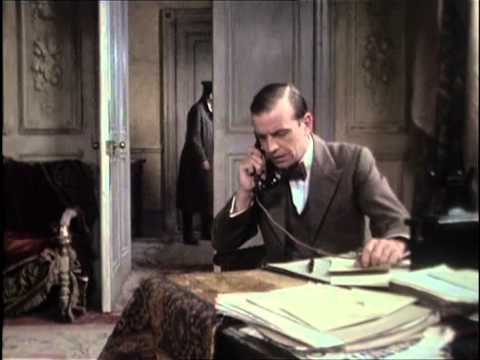
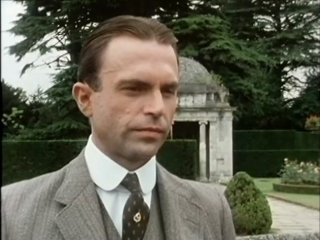
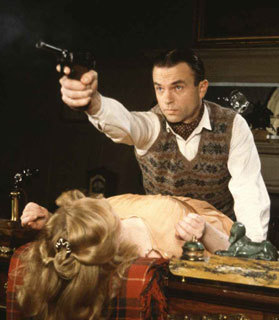
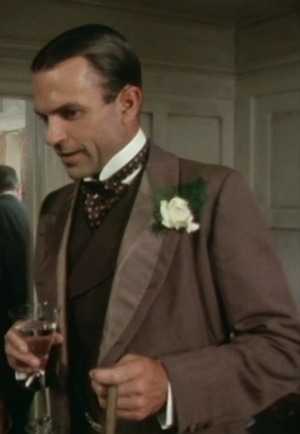


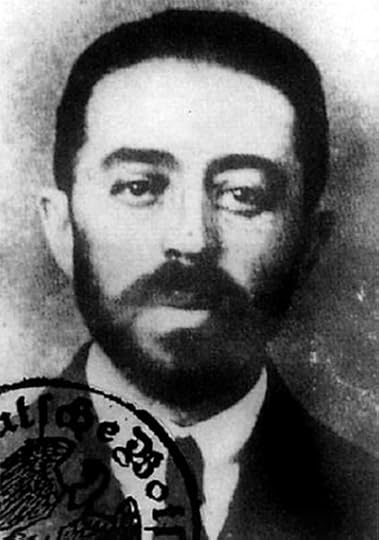


Indeed "Reilly: Ace of Spies" --the series you've found --is the same I admire. The very same!
Sidney Reilly in Odessa in 1904, around the time of the Russo-Sino War --yes, that is the first episode.
Yes, this is where my avatar comes from; although Feliks D. (played by actor Tom Bell) does not appear until later in the programme.
"Ace of Spies" is not my very favorite British TV-miniseries but it is certainly one of my very favorites. (My very favorite British TV mini-series is 'The Singing Detective'.)
But as far as espionage-based British TV miniseries, yes it might even beat out my liking for the Alec Guinness 'Karla' series.
Why? The lush period detail; the wide cast of characters, the acting; the exotic foreign locales (given their due with many outdoor location-shots) and the longer-spanning length of the show. Not to mention the sweeping theme music either (by D. Shostakovish, which has its own little backstory).
"Mr. Palfrey of Westminster" I have no familiarity with this one; but the still-images I'm seeing "on-line" look pretty muddy. I doubt I myself would go out-of-my-way for it; however I would still bet it's probably pretty good. I admit I don't know any of the actors listed; although 'Alec MCowan' does sound familiar. 'Travels with my Aunt' and 'Frenzy' I certainly am a fan of; if indeed that is he. 'Frenzy' is actually my favorite Hitchcock thriller.
Rowan Atkinson: when I hear that name I think of the 'Blackadder' series. Wasn't aware he ever played 'Maigret'. That's good material.
But by all means yes, you ought to stick with Sam Neill (Neill is not an obscure actor, surely?) and his "Reilly" series. Neill is not my favorite 'spy actor' (whatever this phrase means?) but he does very well in this television series.
Sidney Reilly --as you will learn --is a lurid icon from the 'gaslight era' of espionage, of which I am an aficionado. He is one of the dozen real-life historical figures Ian Fleming had in mind when conceiving Bond.
The appeal of "Reilly" is perhaps just this: that it is historically true material; whereas James Bond is not. The corresponding TV series may seem slightly tepid to a random viewer as yourself; but to a 'cinema purist' like me, it hits all the marks.
There's an inherent 'degree of difficult' in writing good drama and good espionage which is historically accurate; but this Thames series is. The fine writing and fine casting ably convey many true incidents from the WWI era.
Most notably, you will see brought to life many behind-the-scenes intrigues of the Bolshevik revolution in which Sidney Reilly had such a hand.
Reilly's arc is rather like that found in "Triple Cross" (Eddie whats-his-name, played by Christopher Plummer) in that he is not entirely faithful to his British controller. He is playing his own game; one which involves personally grabbing women and wealth and power. He was a free agent who only nominally served British interests, 'when it suited him'.
As you will see (near the end of the series) this lowly and callous opportunist briefly held the fate of all the Russias in his hands, when the throne was vacated and the Bolsheviks were stymied by the Social Democrats and Boris Savinkov. With the aid of the disenfranchised Hungarian contingent he almost seized power. A very singular instance of a spy stepping onto the stage as a diplomat.
It's grand stuff.